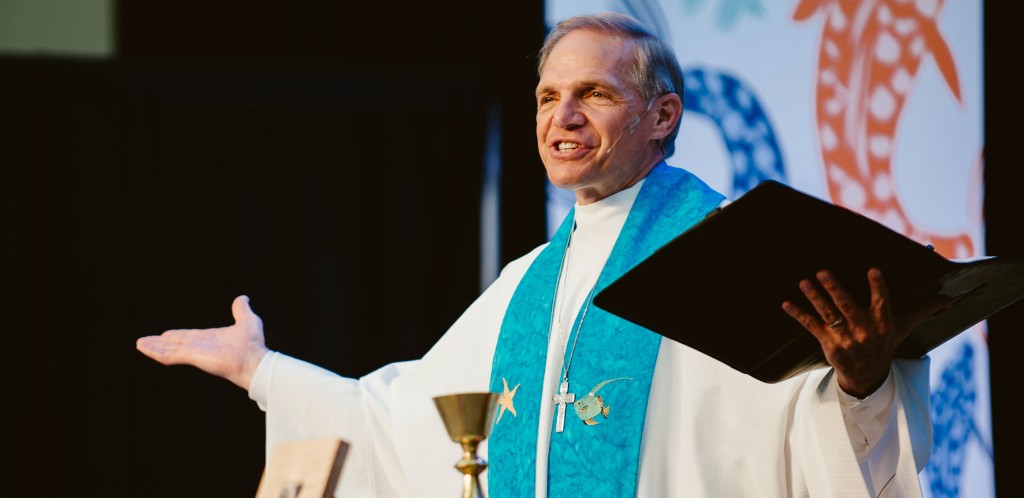The Bible: Scripture, Story, Revelation
Today starts a series about the Bible, God’s word understood as sacred scripture, story and revelation. Today we will focus on sacred scripture.
While growing up, many of the Bibles I saw were leather bound with gold leafing around the edges. You knew just by looking at it that it was an important book. In my church, a big Bible sat on the lectern in the sanctuary and there were Bibles on the altar in every Sunday school classroom. Sometimes there were pictures in the Bible. The pictures were works of art. Always in color. The paper was quality paper. It had substance to it and was always glossy. There was a sheen to every page. Without reading it, you knew this was an important book that was associated with God. When people read the Bible, they did not speak in their normal conversation tones but in what some call a “stained glass voice”, which meant it was read aloud with great seriousness. It was sacred scripture.
I can remember the first time I saw the New Testament edition of the Good News Bible. It was paperback. Its pages were not glossy and the pictures were stick figures. It wasn’t King James English either. It was vernacular, more common day language. As a factory worker, my father loved it. It spoke to him. It made the scriptures real. For some, it was too real, too common. It was like every other paperback book. In our household though, it became the scriptures, the inspired word of God. In a sense, this Bible inspired my father to read it and to teach it not only to the youth in Sunday school but also at home.
Scripture is the sacred writings for religious people. Every religion has a book or books that contain their scripture, their sacred texts. For Christians, the Bible is our scripture and we believe it is a book inspired by God for our salvation and living. We believe it records the history and understanding of God’s relationship with humanity and our relationship with God and one another. There is a wide range of belief and understanding about the Christian scriptures. For instance, Roman Catholics and Orthodox Christians include in their Bible what Protestants call the Apocrypha or 14 additional books written during the inter-testament times, the period between the Old and New Testament.
There are some who view the Bible as “solo scriptura”, the scripture itself or the Bible interprets itself and is the only source for Christian teaching. Sola scriptura emerged, or some would say reemerged at the time of the Reformation, 1517-1648 AD, in response to how church hierarchy used tradition to support teachings, organization and experiences within the church not found the Bible.
Another word used for the scriptures is the canon, which literally means a collection of sacred texts or the collection of books that make up the Bible. Many misunderstand the unfolding of scripture that became the canon, our Bible as we have it today. Some believe that the Bible was written as it happened rather than as stories passed down from generation to generation. Genesis may have been written as late as the period of exile for the Jews, thousands of years after creation and was written down for fear that the history would be lost while the Jews were in exile. The Gospel of John was written between 90-110 AD. It was the last Gospel in our canon and was written some sixty years or more after Jesus’ death.
The canon, the 66 books that make up our Old (Hebrew Bible) and New Testament was not finalized until a little after 400 AD or some 360 years after Jesus’ death. Clarity about the Hebrew Bible emerged much earlier but the New Testament took much longer. There were more Gospels written than the four found in our Bible that were considered. Other books were considered. And during the 360 years that the Bible was being shaped, there were different configurations of the New Testament books under consideration. The last book to be included in the Bible was the Book of Revelation. There were differences of opinion about the book’s efficacy for the church and Christian faith.
Some ask, how we can be sure about the authority of scripture if it was not known as scripture immediately or if there were debates about what books to include. Others want to know about what the church did before the New Testament was finalized. What was considered to be the Word of God?
In the next editions of The Relay, we will look at questions like these, as well as why people interpret scriptures differently and what is the Sacred Story and Sacred Revelation.
My faith and study of the Bible leads me to believe that my earliest notions concerning gold leaf and stained-glass voices were accurate; the Bible is God’s inspired Word and essential for my faith and living. The Bible has revealed God’s salvation for my life, guided me into a relationship with Jesus Christ, taught me how to be a disciple and leader in the church, and inspired me to serve God all my days. Thanks be to God.
Keep the faith!
John
Bishop John Schol
The United Methodist Church
of Greater New Jersey

